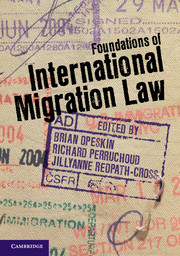Book contents
- Frontmatter
- Summary contents
- Detailed contents
- Preface
- List of case studies
- List of boxes
- List of figures
- List of maps
- List of tables
- Notes on contributors
- Abbreviations
- 1 Conceptualising international migration law
- 2 Contemporary patterns of international migration
- 3 Sources of international migration law
- 4 Nationality and statelessness
- 5 State sovereignty and freedom of movement
- 6 International human rights of migrants
- 7 Refugees and asylum
- 8 Women, children and other marginalised migrant groups
- 9 Human trafficking and smuggling
- 10 International migration by sea and air
- 11 International labour migration
- 12 International trade law and labour mobility
- 13 Global migration institutions and processes
- 14 Regional processes, law and institutional developments on migration
- 15 Emerging legal issues in international migration
- Appendix 1 Cases
- Appendix 2 Treaties and other international instruments
- Glossary
- Index
- References
6 - International human rights of migrants
Published online by Cambridge University Press: 05 November 2012
- Frontmatter
- Summary contents
- Detailed contents
- Preface
- List of case studies
- List of boxes
- List of figures
- List of maps
- List of tables
- Notes on contributors
- Abbreviations
- 1 Conceptualising international migration law
- 2 Contemporary patterns of international migration
- 3 Sources of international migration law
- 4 Nationality and statelessness
- 5 State sovereignty and freedom of movement
- 6 International human rights of migrants
- 7 Refugees and asylum
- 8 Women, children and other marginalised migrant groups
- 9 Human trafficking and smuggling
- 10 International migration by sea and air
- 11 International labour migration
- 12 International trade law and labour mobility
- 13 Global migration institutions and processes
- 14 Regional processes, law and institutional developments on migration
- 15 Emerging legal issues in international migration
- Appendix 1 Cases
- Appendix 2 Treaties and other international instruments
- Glossary
- Index
- References
Summary
INTRODUCTION
As human beings, migrants deserve to be treated with respect. Nonetheless, in many States migrants have not been welcomed. They are exploited and subjected to discrimination. Their security and liberty of movement are infringed. They are denied minority rights, freedom of expression and privacy. Migrants are also placed at risk by arbitrary expulsion and refusal to allow them to acquire the nationality of the host State. They are not accorded economic rights. Despite these problems, there are increasing numbers of migrants – that is, people residing in a State other than the one in which they were born; they comprise over 3 per cent of the world’s population (see Chapter 2).
This chapter will address, first, the evolution of human rights norms and their relevance to migrants, and second, some of the specific rights enjoyed by migrants.
EVOLUTION OF HUMAN RIGHTS NORMS AND THEIR RELEVANCE TO MIGRANTS
From ancient times to the present, there has been a growing but still fragmentary international legal consensus concerning the human rights of non-nationals. The international law of state responsibility originated from issues concerning the treatment of non-nationals, and the rights of non-nationals developed as a precursor to the present-day international human rights regime. What follows is an overview of the development of the rights of ‘outsiders’. This overview highlights the major themes and developments of these rights from ancient to contemporary times.
- Type
- Chapter
- Information
- Foundations of International Migration Law , pp. 152 - 176Publisher: Cambridge University PressPrint publication year: 2012
References
- 2
- Cited by



